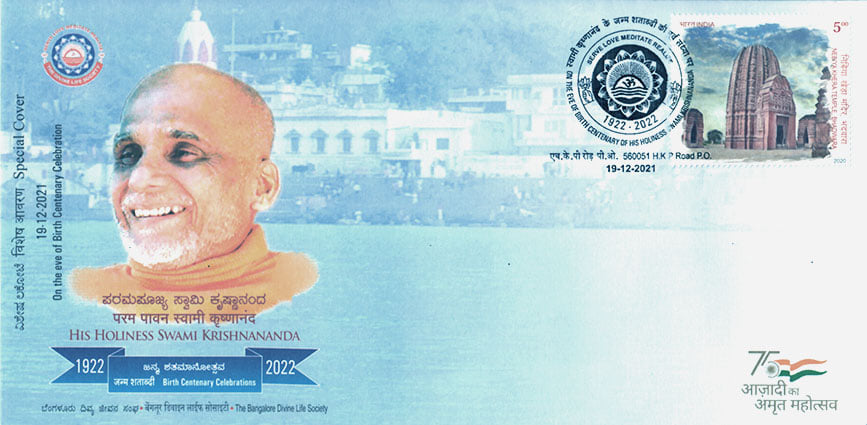Commentary on the Bhagavadgita : 50-5. - Swami Krishnananda.
========================================================================
Chinmaya Mission
Milestones are whizzing past thanks to the efforts of our Tata Mumbai Marathon 2023 Fundraising Champions!
We would like to express our gratitude to Manisha Khemlani Darshini Bhatt Jagdish Peswani for their exemplary contribution and support.
Our fundraisers have already raised over 25 lakhs- with 100% of the proceeds going towards enabling key initiatives in rural development and education.
There are still miles to go in the race. Every gift gives young people a chance to achieve their potential and empowers people of all ages to lead meaningful lives.
Learn more about our vision of a better world, and add your support here.
========================================================================
Sunday, October 16, 2022. 05:00.
Discourse 50: The Eighteenth Chapter Continues – Knowing One's Duty-5.
=========================================================================
Asaktabuddhiḥ sarvatra jitātmā vigataspṛhaḥ (18.49):
The final yoga is summed up here. How do we practise final yoga when we are about to depart from this world?
It is by being totally detached in understanding, and freeing the intellect from involvement with anything whatsoever in the world. Asaktabuddhiḥ sarvatra: In everything, be detached and have no attachment. Jitātmā: Restrained in one's own self.
Vigataspṛhaḥ:
Having no liking for any particular thing in the world.
Naiṣkarmyasiddhiṁ paramāṁ sannyāsenādhigacchatii:
This kind of attitude of self-restraint is called sannyasa, the abandonment of every kind of involvement. Thus practising, one attains to a state where one need not do anything. Naiṣkarmya siddhi is a state where karmas automatically find their fulfilment, and we need not have to engage ourselves in any work later on. Just as rivers move, but they need not move after they reach the ocean, so too one has to work hard until the Universal Being is reached.
There, all actions find their consummation.
Therefore, it is called naiṣkarmya. That is the ultimate perfection which is reached by sannyasa dharma, which is constituted of freedom from attachment, self-restraint, and absence of desire for all things.
------------------------------------------------------------------------------------------------------------------------
Siddhiṁ prāpto yathā brahma tathāpnoti nibodha me, samāsenaiva kaunteya niṣṭhā jñānasya yā parā (18.50):
“How does one attain to this perfection, and attain to Brahman in the end? Please listen to Me. I shall tell you in brief.”
-----------------------------------------------------------------------------------------------------------------------
Buddhyā viśuddhayā yukto dhṛtyātmānaṁ niyamya ca (18.51):
Purifying one's intellect from the dross of rajasic and tamasic desires. Dhṛtyātmānaṁ niyamya ca: By restraining the lower self with the power of the higher self—that is, by restraining oneself in the light of the aspiration for a higher reality.
Śabdādīn viṣayāṁs tyaktvā:
Cutting off connection of all five senses with the objects by withdrawing the five senses from their corresponding objects.
Śabdādīn viṣayāṁs tyaktvā rāgadveṣau vyudasya ca:
Freeing oneself from raga and dvesha, attachment and aversion, like and dislike for anything, and having an equilibrated attitude towards all things.
--------------------------------------------------------------------------------------------------------------------------
Viviktasevī laghvāśī (18.52):
Always wanting to be alone to oneself, and not feeling happy in the midst of people. The more we are alone, the more we feel free and happy. That is the characteristic of a spiritual seeker in an advanced stage. Laghvāśī: Eating only as much as is necessary, and not eating like a glutton.
Yatavākkāyamānasaḥ:
Working only to the extent it is necessary to work. He does not work beyond his limit and become fatigued. He speaks only when it is necessary to speak, and does not speak unnecessarily. He also restrains the mind, and thinks only when it is necessary to think in a particular line. Otherwise, he does not think anything at all because of his inward spiritual approach. Dhyānayogaparo nityaṁ: Always intent on the supreme meditative mood on the ultimate goal of life.
Vairāgyaṁ samupāśritaḥ:
Totally renouncing all attachment to worldly involvements, all perishable objects—anything that is external, spatial and temporal—renouncing all these things by vairagya dharma.
------------------------------------------------------------------------------------------------------------------------
Ahaṁkāraṁ balaṁ darpaṁ kāmaṁ krodhaṁ parigraham vimucya (18.53):
Abandoning self-consciousness, not patting oneself on the back that “I have achieved something. I am a spiritual seeker. God is very kind to me, I have advanced so much”. Do not say this, and do not even feel in your mind that you are a superior person, because nobody can be regarded as so very high in the eye of God. Do not be proud of your energy, strength and capacity; do not be vainglorious in your approach; do not desire things which are unnecessary; do not be subject to anger and irritation; do not accept anything which is not actually necessary for a reasonably comfortable life; never have a feeling of ‘I'-ness and ‘mine'-ness in regard to things; do not go on asserting yourself by saying, “I, I, I” and “mine, mine, mine”. None of these things are permitted, finally. Therefore, one must be calm and quiet inwardly, established in Brahman, free from these turmoils of the psyche which come in the form of ego, etc.
Then one becomes fit for the realisation of Brahman, brahma sakshatkar—brahmabhūyāya kalpate.
-------------------------------------------------------------------------------------------------------------------------
Brahmabhūtaḥ prasannātmā (18.54):
One who is established in Brahman is calm and quiet, and composed in oneself, and neither grieves nor wants anything—na śocati na kāṅkṣati.
Samaḥ sarveṣu bhūteṣu madbhaktiṁ labhate parām:
Devoted to God ultimately, and wanting nothing else. Having an equilibrated attitude towards all living beings, high and low, one is centred in God, and loves God and nothing else—madbhaktim labhate param.
*****
Next 18.55
To be continued
==========================================================================














Comments
Post a Comment